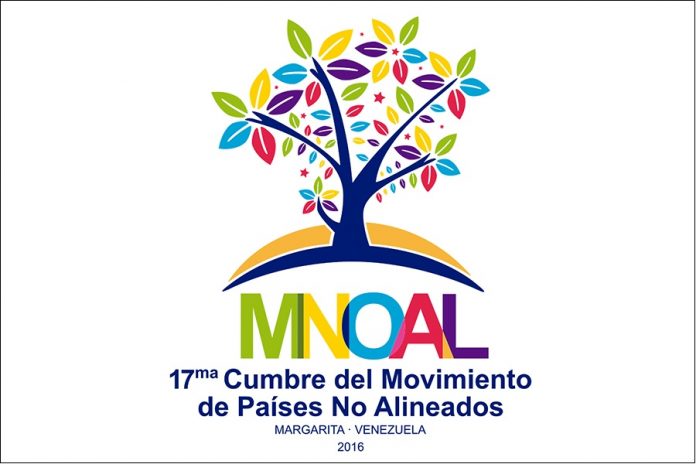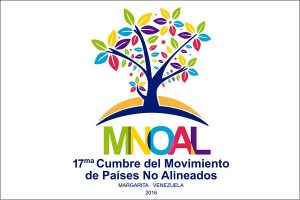17th NAM summit held in Venezuela. Vice President Hamid Ansari held talks with Venezuelan President Nicolas Maduro on a host of issues of mutual interest.
About NAM :
The Non-Aligned Movement (NAM) is a group of states which are not formally aligned with or against any major power bloc. As of 2012, the movement has 120 members.
- The organization was founded inBelgrade in 1961, and was largely conceived by India’s first prime minister, Jawaharlal Nehru; Indonesia’s first president, Sukarno; Egypt’s second president, Gamal Abdel Nasser; Ghana’s first president Kwame Nkrumah; and Yugoslavia’s president, Josip Broz Tito.
- All five leaders were prominent advocates of a middle course for states in theDeveloping Worldbetween the Western and Eastern Blocs in the Cold War. The phrase itself was first used to represent the doctrine by Indian diplomat K. Krishna Menon in 1953, at the United Nations.
- In a speech given during theHavana Declaration of 1979, Fidel Castro addressed the purpose of the organization is to ensure “the national independence, sovereignty, territorial integrity and security of non-aligned countries” in their “struggle againstimperialism, colonialism, neo-colonialism, racism, and all forms of foreign aggression, occupation, domination, interference orhegemony as well as against great power and bloc politics”.
- The countries of the Non-Aligned Movement represent nearly two-thirds of the United Nations’s members and contain 55% of the world population. Membership is particularly concentrated in countries considered to bedeveloping or part of the Third World.
- Members have at times included theSocialist Federal Republic of Yugoslavia, Argentina, Zaire, Cyprus, and Malta. Although many of the Non-Aligned Movement’s members were actually quite closely aligned with one or another of the superpowers, the movement still maintained cohesion throughout the Cold War.
- Some members were involved in serious conflicts with other members (e.g. India and Pakistan, Iran and Iraq). The movement fractured from its own internal contradictions when theSoviet Union invaded Afghanistan in 1979. Although the Soviet allies supported the invasion, other members of the movement (particularly predominantly Muslim states) condemned it.
- Because the Non-Aligned Movement was formed as an attempt to thwart the Cold War,it has struggled to find relevance since the Cold War ended. After the breakup of Yugoslavia, a founding member, its membership was suspended in 1992 at the regular Ministerial Meeting of the Movement, held in New York during the regular yearly session of the General Assembly of the United Nations.
- The successor states of the Socialist Federal Republic of Yugoslavia have expressed little interest in membership, though some have observer status. In 2004, Malta and Cyprus ceased to be members and joined the European Union. Belarus is the only member of the Movement in Europe. Azerbaijan and Fiji are the most recent entrants, joining in 2011. The applications of Bosnia and Herzegovina and Costa Rica were rejected in 1995 and 1998, respectively.
Venezuela Summit:-
Venezuelan President Nicolas Maduro touted the latest meeting of the Non-Aligned Movement (NAM), a large Cold War-era bloc, as one that would be remembered for centuries to come.
- The cash-strapped state reportedly spent more than $120 million in preparation for the summit, despite much of the country suffering from major food shortages and inflation soaring into the triple digits.

- Among the leaders that did attend were Zimbabwe’s Robert Mugabe, Iran’s Hassan Rouhani and Palestine’s Mahmoud Abbas. Heads of state from Venezuela’s regional allies Cuba, Ecuador and Bolivia also attended the summit.
- One notable absentee was Indian Prime Minister Narendra Modi. This is only the second time in 55 years that the country’s head of state has missed the summit.
- Ansari called on Maduro in his first official engagement in Venezuela after arriving here as the leader of the Indian delegation at the Non-Aligned Movement (NAM).
- The two sides had agreed to move ahead for an early finalisation of a number of agreements in different areas, including Extradition Treaty, Double Tax Avoidance Agreement (DTAA), Mutual Legal Assistance Treaty (MLAT) on Criminal Matters and Air Services Agreement.
Venezuela :
♦ Capital: Caracas
♦ Currency: Venezuelan bolívar
♦ President: Nicolás Maduro
AffairsCloud Recommends Oliveboard Mock Test
AffairsCloud Ebook - Support Us to Grow
Govt Jobs by Category
Bank Jobs Notification






